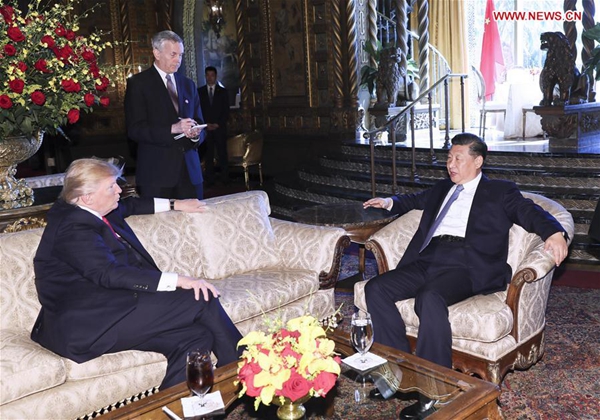Could personal politics ease China-US tensions?
- By Kyle Calandra
 0 Comment(s)
0 Comment(s) Print
Print E-mail China.org.cn, July 14, 2017
E-mail China.org.cn, July 14, 2017
|
|
|
Chinese President Xi Jinping (R) and his U.S. counterpart Donald Trump (L) hold the second round of talks in the Mar-a-Lago resort in Florida, the United States, April 7, 2017. [Xinhua] |
In the months following Donald Trump’s inauguration as American president, the language reflecting the nature of current Sino-U.S. relations followed a common narrative.
In light of his outspoken criticism and aggressive stance against China, questions arose regarding how Chinese, and especially his counterpart, Xi Jinping, should act.
After the relative success of the two presidents’ highly anticipated summit, it seemed Trump and Xi had managed to form the beginnings of a positive working relationship.
However, in the three months since their initial meeting, a host of factors, including the American government’s approval of arms sales to Taiwan and a Senate committee provision allowing U.S. naval ships to call in Taiwanese ports, has added fresh chill to the earlier friendly relations, according to analyst Robert Delaney writing for the South China Morning Post.
Delaney noted that “multiple media outlets have reported on Beijing’s efforts to court [Trump’s daughter Ivanka and her husband Jared Kushner] to help with preparations for the U.S. president’s planned visit to China in November,” perhaps looking to re-establish the friendly relations achieved by Xi and Trump on their first formal meeting in Florida.
In the same article, Delaney also wrote that Orville Schell, director of the Asia Society’s Centre on U.S.-China Relations in New York, believes China’s leaders “recognize that the traditional [Washington] structures, particularly the State Department and the National Security Council, are pretty dysfunctional right now and that, if they’re going to get anything done, personal politics will probably override traditional bureaucratic solutions.”
According to David Lampton, professor and director of China Studies at Johns Hopkins–SAIS and former president of the National Committee on U.S.-China Relations, “The Trump administration still does not have in place the key second, third, and fourth-level policy personnel throughout the bureaucracy with whom the Chinese can effectively and confidently deal.”
Ahead of the U.S. president’s intended visit in November, China should consider any available tool to support an encouraging narrative for Sino-U.S. relations, especially as the Trump administration continues to struggle to develop a recognizable political framework for relations.
Given the fact that the current American president is used to operating in an environment of total control, at the head of a family business, it might be in Beijing’s best interest to pursue temporary diplomatic channels, especially those channels directly linked to Trump’s inner sanctum.
It’s true that Ivanka and her husband have official White House positions working as advisors for both domestic and international issues, but Delaney reminds his readers that neither has had any official foreign policy experience before Trump’s inauguration.
As a result of this inexperience, the problems that could arise from pursuing a brand of more personal political relationship with the two are perhaps too many and too obvious to even be worth mentioning.
As a means of avoiding these difficulties, Robert Daly, the director of the Kissinger Institute of China and the United States, asserted: “It would be best for Beijing and Washington to manage normalized relations through normal channels – well-staffed professional bureaucracies,” hinting of what Schell refers to as the danger of appointing those unfamiliar with the history of U.S.-China relations into roles that might guide the two countries’ relationship in the wrong direction.
Unfortunately, “normalized relations” and “normal channels” are perhaps the last two phrases in the almost inexhaustible breadth of the English language anyone, academic or amateur, would use to describe the current political reality of the United States.
Moreover, the current administration in Washington falls famously short of any “well-staffed professional bureaucracies,” with recruitment difficulties still plaguing the beleaguered White House, spearheaded by a man wholly oblivious to the history of U.S.-China relations and yet now in charge of guiding bilateral relations.
In light of these realities, Beijing may well have everything to gain when it comes to pursuing a brand of personal politics that mirror the professional relationships to which Trump is more accustomed.
As a means of easing rising tensions, any potential drawbacks could take a backseat to further establishing a relationship with the Trump administration and the president’s inner circle in the increasingly uncertain times ahead.
Having previously lived in Beijing working as a journalist and editor, Kyle Calandra is currently based in America reporting on Sino-U.S. Relations as a contributor for China.org.cn.
Opinion articles reflect the views of their authors only, not necessarily those of China.org.cn.







Go to Forum >>0 Comment(s)